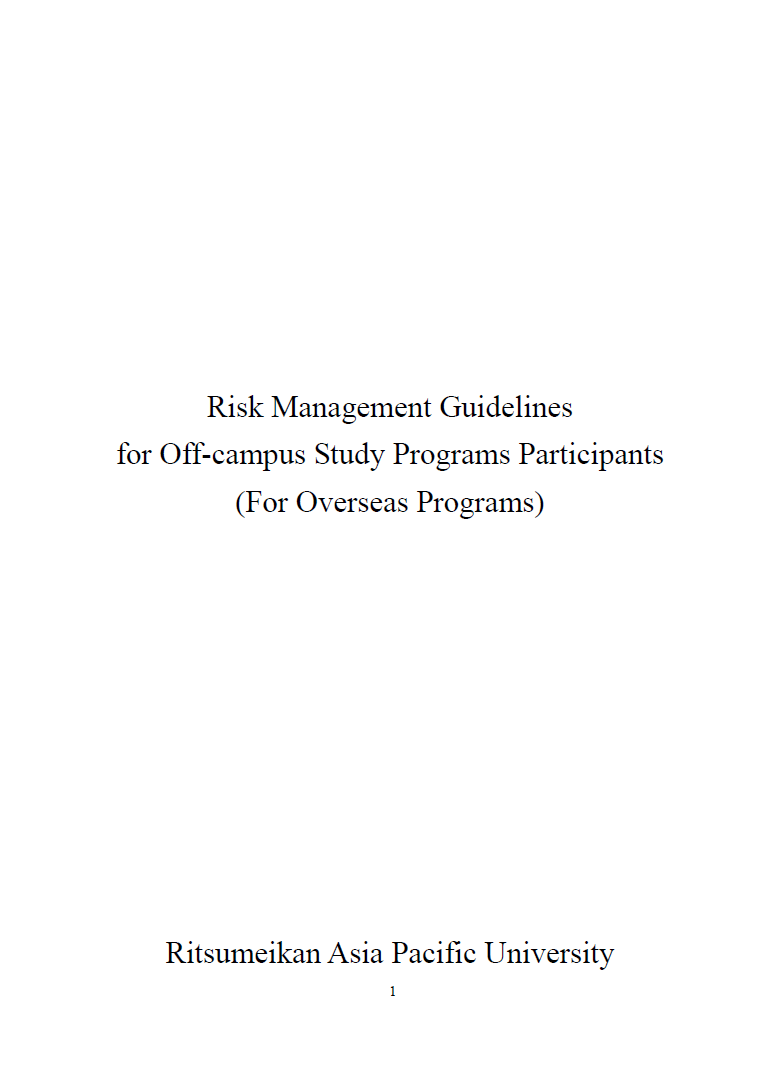
Risk Management
Policies for Implementing Outbound, Overseas Programs
At APU, we consider risk information for each destination, as well as the societal situation, when deciding whether or not to implement overseas programs. If the Japanese Ministry of Foreign Affair’s “Travel Advice and Warning” level is over two for a given country/region, APU will not send students to that country/region. If the “Travel Advice and Warning” level rises above two while a student resides there, as a general rule, their program will be canceled and they will be instructed to return home as quickly as possible. Furthermore, if a new disease begins to spread and a “Warning on Infectious Diseases” is issued, APU may decide to cancel overseas programs depending on the situation.
Mandatory Enrollment in Overseas Travel Insurance and the Risk Management System
In order to provide appropriate information and support in the event of a crisis, students are required to enroll in Overseas Travel Insurance and the Risk Management System (J-TAS) designated by APU. If the host university also requires students to enroll in a specific insurance plan, students must also enroll in the host university’s designated insurance.
The “Risk Management System (J-TAS)” is a service that provides students with information and confirms their safety in a crisis. When a crisis takes place, the IR&C Safety Desk will promptly share information with APU, so that the university grasps the relevant information and can provide appropriate support to students.
If an accident occurs, the Overseas Travel Insurance will provide compensation (costs of treating any injuries sustained or illnesses contracted while traveling overseas, hospitalization fees, compensation liability, rescuer’s expenses, etc.).
Details of the insurance coverage and the insurance application process will be explained at the guidance sessions for internally accepted students.
| Overseas Travel Insurance |
|---|
| Covers fees for injuries sustained or illnesses contracted by the student at their destination, liability compensation for injuries borne by others or damages to another’s belongings for which the student is held responsible, and compensation for damages to or theft of the student’s personal belongings, etc. |
| Risk Management System (J-TAS) |
|---|
|
If students encounter any accidents, incidents, or unforeseen situations, the IR&C Safety Support Desk will advise students on how to deal with each specific situation and support students in conjunction with the university and the insurance company. *J-TAS is not a type of insurance. |
J-TAS (JCSOS Total Assistance Service)
In case of an overseas emergency, the Risk Management System (J-TAS) will provide advice and crisis management information to students who go on overseas programs operated by Ritsumeikan. The Risk Management System (J-TAS) will respond promptly to any situation with the necessary emergency assistance. Furthermore, the Risk Management System (J-TAS) will share information with Ritsumeikan, so as to support the university in executing proper crisis management.
Details about these services and the J-TAS application process will be explained at the guidance sessions for internally accepted students.
Please refer to the below URL for details.
https://www.jcsos.org/traveler *Japanese only.
Overseas Travel Insurance
When students participate in an overseas program operated by APU, they are required to enroll in the overseas travel insurance designated by the university, “Overseas Comprehensive Travel Insurance for Ritsumeikan Students”, even if an individual was previously enrolled in a separate overseas travel insurance.
Ritsumeikan has entered into a comprehensive overseas travel insurance contract, which covers all approved participants in credit-bearing, overseas study programs or trips, such as exchange programs or trainings, at Ritsumeikan schools (i.e. universities, affiliated schools, etc.). Under this contract, the Ritsumeikan Trust is the policy owner, and approved participants in credit-bearing, overseas study programs or trips, such as exchange programs or trainings, are covered under our overseas comprehensive travel insurance.
As part of our comprehensive insurance contract, we receive a discount, which is applied by allowing our students to use past loss ratios.
Additionally, our insurance does not prevent students from purchasing individual insurance policies outside of this system.
Student Preparedness/ Risk Management Guidelines for Students
When you go on an Off-campus Programs, either APU faculty/staff or the faculty/staff at your host university will provide support. However, faculty/staff cannot be with you 24/7, so it’s important to be aware of risks and to protect yourself.
In particular, when you go on an overseas program, people at your destination will follow different rules and things will operate differently. When living or staying overseas, it’s important to sufficiently prepare yourself in advance.
All the information you need to know is in the Risk Management Guidelines. This includes information on how to stay safe while living overseas, information on what to do if you are in trouble, etc.
Read the guidelines ahead of time and put the information within to use.
*Click on the image to view the Guidelines.
Other information to refer to
- ・Overseas Safety Homepage by the Ministry of Foreign Affairs of Japan
(This page is available in Japanese only. You can check the risk level and safety information for each country and region. Be sure to check this before you travel.) - ・Centers for Disease Control and Prevention (Learn about your destination)
- ・Australian Department of Foreign Affairs and Trade, Consular Travel Advice
- ・United Kingdom Foreign and Commonwealth Office, Consular Division Travel Advice
- ・WHO
- ・Tabi Regi by the Ministry of Foreign Affairs of Japan
(This page is available in Japanese only. This is an email service for overseas travelers operated by the Ministry of Foreign Affairs of Japan. You will automatically receive local safety information and emergency alerts in Japanese during your trip. - ・”Staying Healthy Overseas” by the Ministry of Health, Labour and Welfare of Japan



